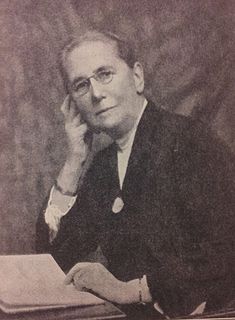A Quote by Immortal Technique
I've had lots of discussions with my Muslim brothers and sisters who have said to me, "Christianity is a white man's religion" But I'm like, "how is that possible when Christianity went into Africa before it ever went into central Europe?" Even the first people to become a Christian nation were not Romans, they weren't the Byzantines either, they weren't the Greeks... the first people to claim a Christian empire were the Armenians.
Related Quotes
There is no ground whatever for the claim, so often made by religious apologists, that these ideals are specifically Christian and originated with Jesus. What were specifically Christian were some of the less enlightened teachings, which have done untold harm. Christians claim that organised Christianity has been a great force for good, but this view can be maintained on one assumption only: that everything good in the Christian era is a result of Christianity and everything bad happened in spite of it.
Christians have always tended to transform the Christian Revelation into a Christian religion. Christianity is said to be a religion like any other or, conversely, some Christians try to show that it is a better religion than the others. People attempt to take possession of God. Theology claims to explain everything, including the being of God. People tend to transform Christianity into a religion because the Christian faith obviously places people in an extremely uncomfortable position that of freedom guided only by love and all in the context of God's radical demand that we be holy.
Ask me if Christianity (my version of it, yours, the Pope's, whoever's) is orthodox, meaning true, and here's my honest answer: a little, but not yet. Assuming by Christianity you mean the Christian understanding of the world and God, Christian opinions on soul, text, and culture I'd have to say that we probably have a couple of things right, but a lot of things wrong, and even more spreads before us unseen and unimagined. But at least our eyes are open! To be a Christian in a generously orthodox way is not to claim to have the truth captured, stuffed, and mounted on the wall.
I came to the conclusion long ago that all religions were true and that also that all had some error in them, and while I hold by my own religion, I should hold other religions as dear as Hinduism. So we can only pray, if we were Hindus, not that a Christian should become a Hindu; but our innermost prayer should be that a Hindu should become a better Hindu, a Muslim a better Muslim, and a Christian a better Christian.
There were honest people long before there were Christians and there are, God be praised, still honest people where there are no Christians. It could therefore easily be possible that people are Christians because true Christianity corresponds to what they would have been even if Christianity did not exist.
If the Christian church is to move responsibly towards the future, it must restore or renew its ties with its past. Contemporary Catholic and Protestant radicals want to claim that Christianity means whatever Christian today happen to believe and practice, be it pantheism, unitarianism, or sodomy. The Christian faith has suffered immeasurable harm because of the tendency of people to use the word Christian in a careless and non-historical way. Nothing in this argument would preclude liberal Protestants and Catholics from developing and practicing any religion they like.
Before Christianity became the Roman Empire's official religion in the 4th Century, 'mystery religions,' organized around a central canon of secret knowledge, were widespread. Membership in such religions was limited to people who had passed through secret initiation rituals and had begun to learn a body of hidden knowledge.
Religion is much more than language, but to be Christian does mean speaking Christian for most people. The language many of us use has contributed to the crisis in Christianity in North America. Traditional Christian language is becoming less familiar to millions of people. The language is frequently misunderstood by people.
People are very surprised to hear me say that a lot of my values are Christian values. I think that's part of my shock. I just don't like the way that Christianity combined with the influence of television has bred a nation of weakness. (Christian television do get the facts wrong sometimes and the image they portray turns most people off.)
When I moved to L. A. with this little wimpy garage band, the first people we met were the Doors. Then we met Jimi Hendrix, Janis Joplin. All of the people who died of excess were our big brothers and sisters. So I said to myself: How do you become a legend and enjoy it? The answer is to create a character as legendary as those guys and leave that character on the stage.
It was not Christianity which freed the slave: Christianity accepted slavery; Christian ministers defended it; Christian merchants trafficked in human flesh and blood, and drew their profits from the unspeakable horrors of the middle passage. Christian slaveholders treated their slaves as they did the cattle in their fields: they worked them, scourged them, mated them , parted them, and sold them at will. Abolition came with the decline in religious belief, and largely through the efforts of those who were denounced as heretics.

































